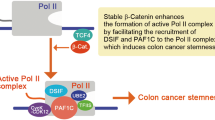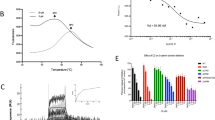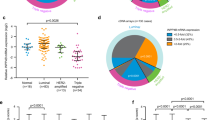Abstract
Activation of cGMP-dependent protein kinase (PKG) has anti-tumor effects in colon cancer cells but the mechanisms are not fully understood. This study has examined the regulation of β-catenin/TCF signaling, as this pathway has been highlighted as central to the anti-tumor effects of PKG. We show that PKG activation in SW620 cells results in reduced β-catenin expression and a dramatic inhibition of TCF-dependent transcription. PKG did not affect protein stability, nor did it increase phosphorylation of the amino-terminal Ser33/37/Thr41 residues that are known to target β-catenin for degradation. However, we found that PKG potently inhibited transcription from a luciferase reporter driven by the human CTNNB1 promoter, and this corresponded to reduced β-catenin mRNA levels. Although PKG was able to inhibit transcription from both the CTNNB1 and TCF reporters, the effect on protein levels was less consistent. Ectopic PKG had a marginal effect on β-catenin protein levels in SW480 and HCT116 but was able to inhibit TCF-reporter activity by over 80%. Investigation of alternative mechanisms revealed that cJun-N-terminal kinase (JNK) activation was required for the PKG-dependent regulation of TCF activity. PKG activation caused β-catenin to bind to FOXO4 in colon cancer cells, and this required JNK. Activation of PKG was also found to increase the nuclear content of FOXO4 and increase the expression of the FOXO target genes MnSOD and catalase. FOXO4 activation was required for the inhibition of TCF activity as FOXO4-specific short-interfering RNA completely blocked the inhibitory effect of PKG. These data illustrate a dual-inhibitory effect of PKG on TCF activity in colon cancer cells that involves reduced expression of β-catenin at the transcriptional level, and also β-catenin sequestration by FOXO4 activation.
This is a preview of subscription content, access via your institution
Access options
Subscribe to this journal
Receive 50 print issues and online access
$259.00 per year
only $5.18 per issue
Buy this article
- Purchase on Springer Link
- Instant access to full article PDF
Prices may be subject to local taxes which are calculated during checkout






Similar content being viewed by others
References
Almeida M, Han L, Martin-Millan M, O'Brien CA, Manolagas SC . (2007). Oxidative stress antagonizes Wnt signaling in osteoblast precursors by diverting beta-catenin from T cell factor- to forkhead box O-mediated transcription. J Biol Chem 282: 27298–27305.
Arden KC . (2006). Multiple roles of FOXO transcription factors in mammalian cells point to multiple roles in cancer. Exp Gerontol 41: 709–717.
Behrens J . (1999). Cadherins and catenins: role in signal transduction and tumor progression. Cancer Metastasis Rev 18: 15–30.
Behrens J . (2000). Control of beta-catenin signaling in tumor development. Ann N Y Acad Sci 910: 21–33; discussion 33–35.
Blom N, Sicheritz-Ponten T, Gupta R, Gammeltoft S, Brunak S . (2004). Prediction of post-translational glycosylation and phosphorylation of proteins from the amino acid sequence. Proteomics 4: 1633–1649.
Browning DD . (2008). Protein kinase G as a therapeutic target for the treatment of metastatic colorectal cancer. Expert Opin Ther Targets 12: 367–376.
Browning DD, Mc Shane M, Marty C, Ye RD . (2001). Functional analysis of type 1alpha cGMP-dependent protein kinase using green fluorescent fusion proteins. J Biol Chem 276: 13039–13048.
Burgering BM . (2008). A brief introduction to FOXOlogy. Oncogene 27: 2258–2262.
Burgoyne JR, Madhani M, Cuello F, Charles RL, Brennan JP, Schroder E et al. (2007). Cysteine redox sensor in PKGIa enables oxidant-induced activation. Science 317: 1393–1397.
Calnan DR, Brunet A . (2008). The FoxO code. Oncogene 27: 2276–2288.
Cen B, Deguchi A, Weinstein IB . (2008). Activation of protein kinase G increases the expression of p21CIP1, p27KIP1, and histidine triad protein 1 through Sp1. Cancer Res 68: 5355–5362.
Clevers H . (2006). Wnt/beta-catenin signaling in development and disease. Cell 127: 469–480.
Dansen TB, Burgering BM . (2008). Unravelling the tumor-suppressive functions of FOXO proteins. Trends Cell Biol 18: 421–429.
Deguchi A, Thompson WJ, Weinstein IB . (2004). Activation of protein kinase G is sufficient to induce apoptosis and inhibit cell migration in colon cancer cells. Cancer Res 64: 3966–3973.
Essers MA, de Vries-Smits LM, Barker N, Polderman PE, Burgering BM, Korswagen HC . (2005). Functional interaction between beta-catenin and FOXO in oxidative stress signaling. Science 308: 1181–1184.
Essers MA, Weijzen S, de Vries-Smits AM, Saarloos I, de Ruiter ND, Bos JL et al. (2004). FOXO transcription factor activation by oxidative stress mediated by the small GTPase Ral and JNK. EMBO J 23: 4802–4812.
Fang D, Hawke D, Zheng Y, Xia Y, Meisenhelder J, Nika H et al. (2007). Phosphorylation of beta-catenin by AKT promotes beta-catenin transcriptional activity. J Biol Chem 282: 11221–11229.
Federico A, Morgillo F, Tuccillo C, Ciardiello F, Loguercio C . (2007). Chronic inflammation and oxidative stress in human carcinogenesis. Int J Cancer 121: 2381–2386.
Fodde R, Brabletz T . (2007). Wnt/beta-catenin signaling in cancer stemness and malignant behavior. Curr Opin Cell Biol 19: 150–158.
Forte Jr LR . (2004). Uroguanylin and guanylin peptides: pharmacology and experimental therapeutics. Pharmacol Ther 104: 137–162.
Forte LR, London RM, Krause WJ, Freeman RH . (2000). Mechanisms of guanylin action via cyclic GMP in the kidney. Annu Rev Physiol 62: 673–695.
Francis SH, Corbin JD . (1999). Cyclic nucleotide-dependent protein kinases: intracellular receptors for cAMP and cGMP action. Crit Rev Clin Lab Sci 36: 275–328.
Fu Z, Tindall DJ . (2008). FOXOs, cancer and regulation of apoptosis. Oncogene 27: 2312–2319.
Giles RH, van Es JH, Clevers H . (2003). Caught up in a Wnt storm: Wnt signaling in cancer. Biochim Biophys Acta 1653: 1–24.
Goluboff ET . (2001). Exisulind, a selective apoptotic antineoplastic drug. Expert Opin Investig Drugs 10: 1875–1882.
Haanen C . (2001). Sulindac and its derivatives: a novel class of anticancer agents. Curr Opin Investig Drugs 2: 677–683.
Hino S, Tanji C, Nakayama KI, Kikuchi A . (2005). Phosphorylation of beta-catenin by cyclic AMP-dependent protein kinase stabilizes beta-catenin through inhibition of its ubiquitination. Mol Cell Biol 25: 9063–9072.
Ho KK, Myatt SS, Lam EW . (2008). Many forks in the path: cycling with FoxO. Oncogene 27: 2300–2311.
Hoogeboom D, Burgering BM . (2009). Should I stay or should I go: beta-catenin decides under stress. Biochim Biophys Acta 1796: 63–74.
Hoogeboom D, Essers MA, Polderman PE, Voets E, Smits LM, Burgering BM . (2008). Interaction of FOXO with beta-catenin inhibits beta-catenin/T cell factor activity. J Biol Chem 283: 9224–9230.
Hou Y, Gupta N, Schoenlein P, Wong E, Martindale R, Ganapathy V et al. (2006a). An anti-tumor role for cGMP-dependent protein kinase. Cancer Lett 240: 60–68.
Hou Y, Wong E, Martin J, Schoenlein PV, Dostmann WR, Browning DD . (2006b). A role for cyclic-GMP dependent protein kinase in anoikis. Cell Signal 18: 882–888.
Huang H, Tindall DJ . (2007). Dynamic FoxO transcription factors. J Cell Sci 120: 2479–2487.
Jin T, George Fantus I, Sun J . (2008). Wnt and beyond Wnt: multiple mechanisms control the transcriptional property of beta-catenin. Cell Signal 20: 1697–1704.
Katoh M, Katoh M . (2007). WNT signaling pathway and stem cell signaling network. Clin Cancer Res 13: 4042–4045.
Kwon IK, Schoenlein PV, Delk J, Liu K, Thangaraju M, Dulin NO et al. (2008). Expression of cyclic guanosine monophosphate-dependent protein kinase in metastatic colon carcinoma cells blocks tumor angiogenesis. Cancer 112: 1462–1470.
Li H, Pamukcu R, Thompson WJ . (2002). beta-Catenin signaling: therapeutic strategies in oncology. Cancer Biol Ther 1: 621–625.
Li Q, Dashwood WM, Zhong X, Al-Fageeh M, Dashwood RH . (2004). Cloning of the rat beta-catenin gene (Ctnnb1) promoter and its functional analysis compared with the Catnb and CTNNB1 promoters. Genomics 83: 231–242.
Lin SY, Xia W, Wang JC, Kwong KY, Spohn B, Wen Y et al. (2000). Beta-catenin, a novel prognostic marker for breast cancer: its roles in cyclin D1 expression and cancer progression. Proc Natl Acad Sci USA 97: 4262–4266.
Lincoln TM, Dey N, Sellak H . (2001). Invited review: cGMP-dependent protein kinase signaling mechanisms in smooth muscle: from the regulation of tone to gene expression. J Appl Physiol 91: 1421–1430.
Liu L, Li H, Underwood T, Lloyd M, David M, Sperl G et al. (2001). Cyclic GMP-dependent protein kinase activation and induction by exisulind and CP461 in colon tumor cells. J Pharmacol Exp Ther 299: 583–592.
Lustig B, Behrens J . (2003). The Wnt signaling pathway and its role in tumor development. J Cancer Res Clin Oncol 129: 199–221.
Luu HH, Zhang R, Haydon RC, Rayburn E, Kang Q, Si W et al. (2004). Wnt/beta-catenin signaling pathway as a novel cancer drug target. Curr Cancer Drug Targets 4: 653–671.
Maiese K, Chong ZZ, Shang YC, Hou J . (2008). Clever cancer strategies with FoxO transcription factors. Cell Cycle 7: 3829–3839.
Pitari GM, Di Guglielmo MD, Park J, Schulz S, Waldman SA . (2001). Guanylyl cyclase C agonists regulate progression through the cell cycle of human colon carcinoma cells. Proc Natl Acad Sci USA 98: 7846–7851.
Ruth P . (1999). Cyclic GMP-dependent protein kinases: understanding in vivo functions by gene targeting. Pharmacol Ther 82: 355–372.
Schlange T, Matsuda Y, Lienhard S, Huber A, Hynes NE . (2007). Autocrine WNT signaling contributes to breast cancer cell proliferation via the canonical WNT pathway and EGFR transactivation. Breast Cancer Res 9: R63.
Shailubhai K, Yu HH, Karunanandaa K, Wang JY, Eber SL, Wang Y et al. (2000). Uroguanylin treatment suppresses polyp formation in the Apc(Min/+) mouse and induces apoptosis in human colon adenocarcinoma cells via cyclic GMP. Cancer Res 60: 5151–5157.
Soh JW, Kazi JU, Li H, Thompson WJ, Weinstein IB . (2008). Celecoxib-induced growth inhibition in SW480 colon cancer cells is associated with activation of protein kinase G. Mol Carcinog 47: 519–525.
Soh JW, Mao Y, Kim MG, Pamukcu R, Li H, Piazza GA et al. (2000). Cyclic GMP mediates apoptosis induced by sulindac derivatives via activation of c-Jun NH2-terminal kinase 1. Clin Cancer Res 6: 4136–4141.
Soh JW, Mao Y, Liu L, Thompson WJ, Pamukcu R, Weinstein IB . (2001). Protein kinase G activates the JNK1 pathway via phosphorylation of MEKK1. J Biol Chem 276: 16406–16410.
Sparks AB, Morin PJ, Vogelstein B, Kinzler KW . (1998). Mutational analysis of the APC/beta-catenin/Tcf pathway in colorectal cancer. Cancer Res 58: 1130–1134.
Strate LL, Syngal S . (2005). Hereditary colorectal cancer syndromes. Cancer Causes Control 16: 201–213.
Takahashi-Yanaga F, Sasaguri T . (2007). The Wnt/beta-catenin signaling pathway as a target in drug discovery. J Pharmacol Sci 104: 293–302.
Taurin S, Sandbo N, Qin Y, Browning D, Dulin NO . (2006). Phosphorylation of beta-catenin by cyclic AMP-dependent protein kinase. J Biol Chem 281: 9971–9976.
Thompson WJ, Piazza GA, Li H, Liu L, Fetter J, Zhu B et al. (2000). Exisulind induction of apoptosis involves guanosine 3′,5′-cyclic monophosphate phosphodiesterase inhibition, protein kinase G activation, and attenuated beta-catenin. Cancer Res 60: 3338–3342.
Uzzau S, Fasano A . (2000). Cross-talk between enteric pathogens and the intestine. Cell Microbiol 2: 83–89.
van der Vos KE, Coffer PJ . (2008). FOXO-binding partners: it takes two to tango. Oncogene 27: 2289–2299.
Weidinger C, Krause K, Klagge A, Karger S, Fuhrer D . (2008). Forkhead box-O transcription factor: critical conductors of cancer's fate. Endocr Relat Cancer 15: 917–929.
Xu W, Kimelman D . (2007). Mechanistic insights from structural studies of beta-catenin and its binding partners. J Cell Sci 120: 3337–3344.
Zhu B, Vemavarapu L, Thompson WJ, Strada SJ . (2005). Suppression of cyclic GMP-specific phosphodiesterase 5 promotes apoptosis and inhibits growth in HT29 cells. J Cell Biochem 94: 336–350.
Acknowledgements
Supported by grants from the American Cancer Society (RSG-07-174-01-CSM to DDB and RSG-09-209-01-TBG to KL) and the National Institutes of Health (CA133085 to KL).
Author information
Authors and Affiliations
Corresponding author
Ethics declarations
Competing interests
The authors declare no conflict of interest.
Additional information
Supplementary Information accompanies the paper on the Oncogene website
Rights and permissions
About this article
Cite this article
Kwon, IK., Wang, R., Thangaraju, M. et al. PKG inhibits TCF signaling in colon cancer cells by blocking β-catenin expression and activating FOXO4. Oncogene 29, 3423–3434 (2010). https://doi.org/10.1038/onc.2010.91
Received:
Revised:
Accepted:
Published:
Issue Date:
DOI: https://doi.org/10.1038/onc.2010.91
Keywords
This article is cited by
-
Impaired intestinal stem cell activity in ETEC infection: enterotoxins, cyclic nucleotides, and Wnt signaling
Archives of Toxicology (2022)
-
The novel ZEB1-upregulated protein PRTG induced by Helicobacter pylori infection promotes gastric carcinogenesis through the cGMP/PKG signaling pathway
Cell Death & Disease (2021)
-
A miRNA signature for an environmental heterocyclic amine defined by a multi-organ carcinogenicity bioassay in the rat
Archives of Toxicology (2017)
-
c-Jun N-terminal kinase activation has a prognostic implication and is negatively associated with FOXO1 activation in gastric cancer
BMC Gastroenterology (2016)
-
Phosphodiesterase 10A: a novel target for selective inhibition of colon tumor cell growth and β-catenin-dependent TCF transcriptional activity
Oncogene (2015)



